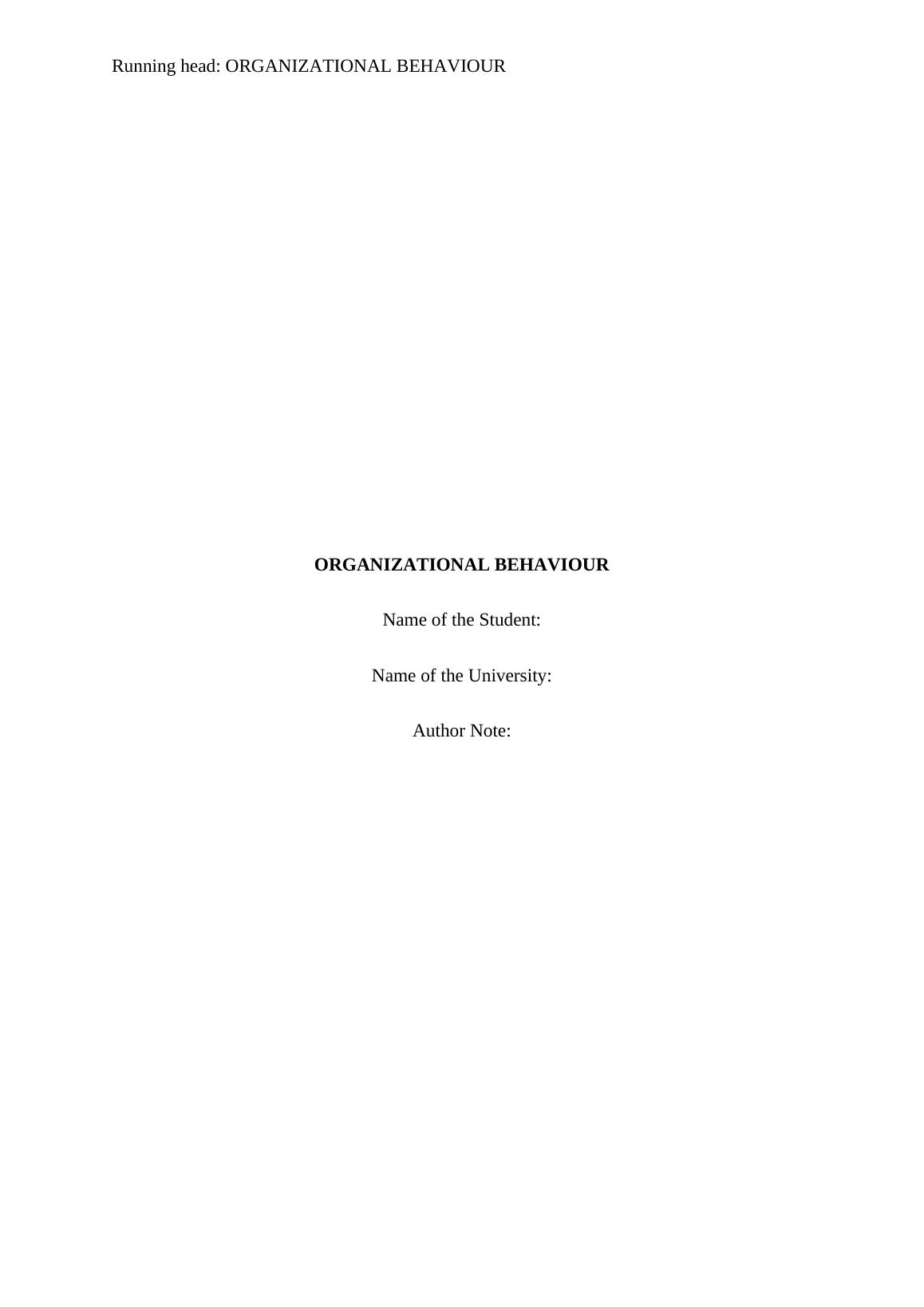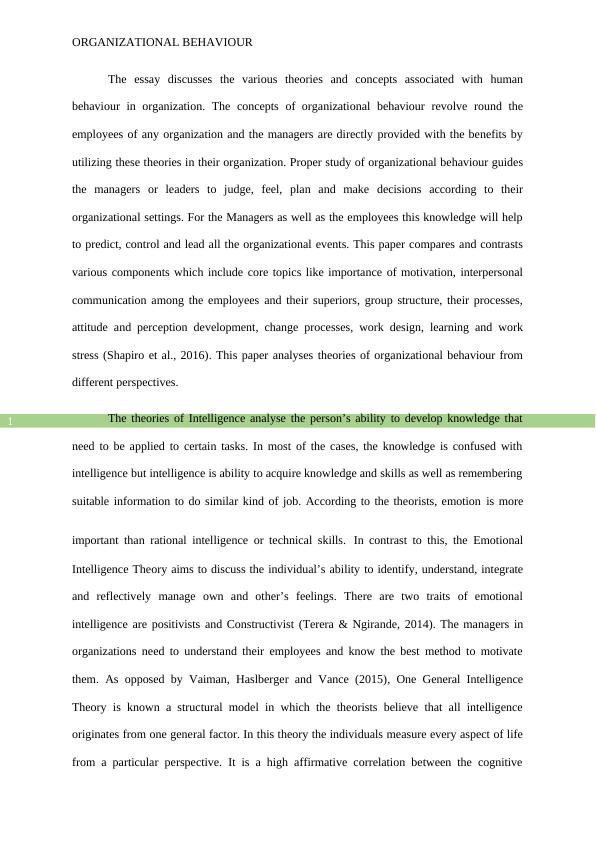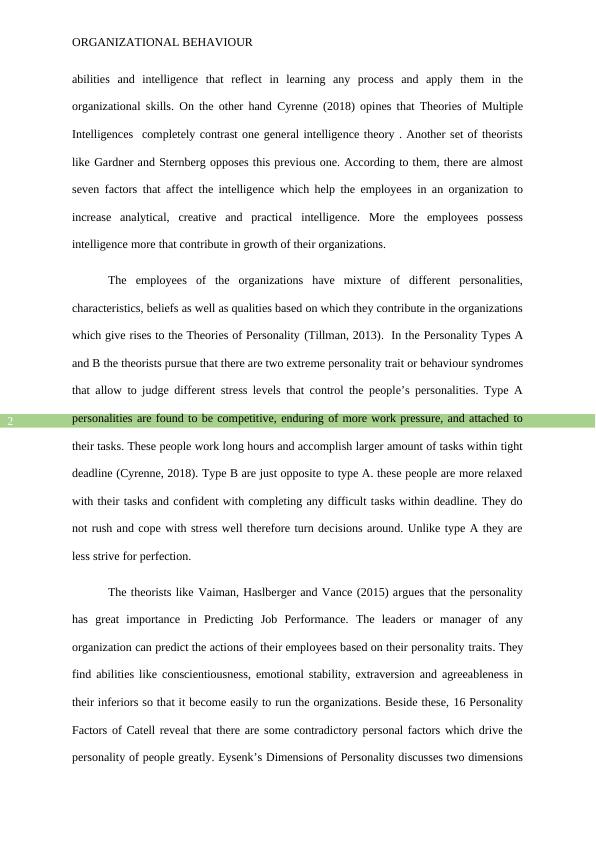Organizational Behavior Theories and Concept
8 Pages2294 Words218 Views
Added on 2020-05-16
Organizational Behavior Theories and Concept
Added on 2020-05-16
ShareRelated Documents
Running head: ORGANIZATIONAL BEHAVIOURORGANIZATIONAL BEHAVIOURName of the Student:Name of the University:Author Note:

1ORGANIZATIONAL BEHAVIOURThe essay discusses the various theories and concepts associated with humanbehaviour in organization. The concepts of organizational behaviour revolve round theemployees of any organization and the managers are directly provided with the benefits byutilizing these theories in their organization. Proper study of organizational behaviour guidesthe managers or leaders to judge, feel, plan and make decisions according to theirorganizational settings. For the Managers as well as the employees this knowledge will helpto predict, control and lead all the organizational events. This paper compares and contrastsvarious components which include core topics like importance of motivation, interpersonalcommunication among the employees and their superiors, group structure, their processes,attitude and perception development, change processes, work design, learning and workstress (Shapiro et al., 2016). This paper analyses theories of organizational behaviour fromdifferent perspectives.The theories of Intelligence analyse the person’s ability to develop knowledge thatneed to be applied to certain tasks. In most of the cases, the knowledge is confused withintelligence but intelligence is ability to acquire knowledge and skills as well as rememberingsuitable information to do similar kind of job. According to the theorists, emotion is moreimportant than rational intelligence or technical skills.In contrast to this, the EmotionalIntelligence Theory aims to discuss the individual’s ability to identify, understand, integrateand reflectively manage own and other’s feelings. There are two traits of emotionalintelligence are positivists and Constructivist (Terera & Ngirande, 2014). The managers inorganizations need to understand their employees and know the best method to motivatethem. As opposed by Vaiman, Haslberger and Vance (2015), One General IntelligenceTheory is known a structural model in which the theorists believe that all intelligenceoriginates from one general factor. In this theory the individuals measure every aspect of lifefrom a particular perspective. It is a high affirmative correlation between the cognitive

2ORGANIZATIONAL BEHAVIOURabilities and intelligence that reflect in learning any process and apply them in theorganizational skills. On the other hand Cyrenne (2018) opines that Theories of MultipleIntelligences completely contrast one general intelligence theory . Another set of theoristslike Gardner and Sternberg opposes this previous one. According to them, there are almostseven factors that affect the intelligence which help the employees in an organization toincrease analytical, creative and practical intelligence. More the employees possessintelligence more that contribute in growth of their organizations. The employees of the organizations have mixture of different personalities,characteristics, beliefs as well as qualities based on which they contribute in the organizationswhich give rises to the Theories of Personality(Tillman, 2013). In the Personality Types Aand B the theorists pursue that there are two extreme personalitytrait or behaviour syndromesthat allow to judge different stress levels that control the people’s personalities. Type Apersonalities are found to be competitive, enduring of more work pressure, and attached totheir tasks. These people work long hours and accomplish larger amount of tasks within tightdeadline (Cyrenne, 2018). Type B are just opposite to type A. these people are more relaxedwith their tasks and confident with completing any difficult tasks within deadline. They donot rush and cope with stress well therefore turn decisions around. Unlike type A they areless strive for perfection.The theorists like Vaiman, Haslberger and Vance (2015) argues that the personalityhas great importance inPredicting Job Performance. The leaders or manager of anyorganization can predict the actions of their employees based on their personalitytraits. Theyfind abilities like conscientiousness, emotional stability, extraversion and agreeableness intheir inferiors so that it become easily to run the organizations. Beside these, 16 PersonalityFactors of Catell reveal that there are some contradictory personal factors which drive thepersonality of people greatly. Eysenk’s Dimensions of Personality discusses two dimensions

End of preview
Want to access all the pages? Upload your documents or become a member.
Related Documents
The Significance of Emotional Intelligence in Contemporary Leadership Techniqueslg...
|8
|1912
|480
Comparing and Contrasting Theoretical Arguments on Personality and Its Implications for Organizationslg...
|6
|2028
|224
BUSS 5069 - Leadership and People Performance - Case Studylg...
|3
|557
|234
Historical Development of Leadership and Managementlg...
|6
|1376
|10
Organizational Behavior-Self-Assessmentlg...
|12
|2767
|288
Report on Effective Organizational Behaviour Pdflg...
|13
|3663
|204
